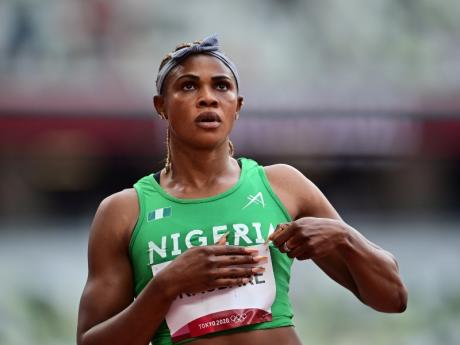Andre Lowe and Kayon Raynor
A major United States law enforcement agency is now pursuing the anti-doping case involving provisionally suspended Nigerian sprinter Blessing Okagbare, according to two sources with knowledge of the matter.
The investigations, which are grounded in the United States, fall under the controversial Rodchenkov Anti-Doping Act, passed by the U.S. Government in December 2020.
It grants extraterritorial jurisdiction under major international doping fraud conspiracies.
While the Act provides the legal framework for the prosecution of individuals involved in doping schemes at international sports competitions involving American athletes, broadcasters and sponsors, under the law, criminal prosecution cannot be brought against athletes, who test positive for performance-enhancing substances, such as in this case, Okagbare.
WHAT THE ACT SAYS:
“It shall be unlawful for any person, other than an athlete, to knowingly carry into effect, or conspire with any other person to carry into effect a scheme in commerce to influence by use of a prohibited substance or prohibited method any major international sports competition."
The legislation stipulates criminal penalties including a prison sentence and a fine.
Section 4 of the Act, in part, speaks to criminal penalties and statute of limitations under major international doping fraud conspiracies.
Whoever violates Section 3 shall be sentenced to a term of imprisonment for not more than 10 years, fined US$250,000 if the person is an individual or US$1,000, 000 if the defendant is other than an individual, or both.
Why Okagbare was provisionally suspended
This development comes just over a month after Okagbare was barred from contesting the 100m semi-finals at the Tokyo Olympics having been provisionally suspended by the Athletics Integrity Unit (AIU) on July 31.
She was suspended for using the banned drug Human Growth Hormone (HGH).
Under the World Anti-Doping Agency rules, the use of HGH, an anabolic steroid, carries a maximum four-year ban for first time offenders.
Contacted by messenger application WhatsApp for a comment on the criminal investigation by the law enforcement agency, on September 18, Okagbare declined.
“I don't have anything to say to you nor anyone,” the 2013 World Championship Long Jump silver medallist told the RJRGLEANER Group.
“With due respect, I don't know how you got my number or who asked you to call me,” she added.
Two days earlier (Sept. 16), the US law enforcement agency, told the RJRGLEANER Group “no comment”, when queries were made about their involvement in the Okagbare anti-doping matter.
It should be noted that the agency's policy is to not confirm or deny involvement in cases.
The Athletics Integrity Unit (AIU) would not be drawn into providing any update on the case of the 32-year-old sprinter.
"As the case is ongoing, there aren't further updates we can share at this stage,” AIU official Julie Burley said in an emailed response on September 28.
She said any announcements or news will be posted on the AIU website and social channels when relevant.
In its July 31 press release, AIU indicated that Okagbare's adverse analytical finding was discovered during an out-of-competition test on July 19.
It should be noted that to date, there has been no update on the status of Okagbare's 'B' sample.
Okagbare's doping violation fell within the 10-day period preceding the Opening Ceremony of the Tokyo Olympics, which is classified under the Tokyo 2020 Anti-Doping Regulations, outlined by the Court of Arbitration for Sport, as the start of the event's competition period.
Rule 59.2.2.4 in the Olympic Charter states: “The IOC Executive Board may delegate its power to a disciplinary commission.”
Meanwhile, Okagbare's coach at the Jacksonville, Florida-based Tumbleweed Track Club, Rana Reider, has denied any knowledge or involvement in the anti-doping matter.
“The situation with Blessing Okagbare has nothing to do with Tumbleweed Track Club, I know nothing about any investigation, and I have had no communication whatsoever with Blessing since news of her positive test came out,” Reider told the RJRGLEANER Group.
At least one source with close connections to Tumbleweed, informed that multiple athletes from the club were questioned during the Olympics following the AIU's announcement of Okagbare's doping violation.
When contacted, agent Paul Doyle declined comment on the matter.
It is also understood that since the doping violation, Doyle has not been representing Okagbare.
About the Rodchenkov Anti-Doping Act
The Rodchenkov Anti-Doping Act is named after the former head of Moscow's anti-doping laboratory, Grigory Rodchenkov, who exposed wide scale State-sponsored doping in Russia.
Source: https://jamaica-gleaner.com

